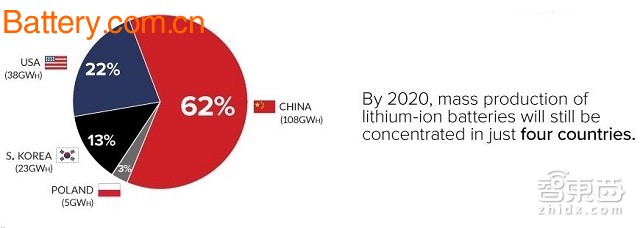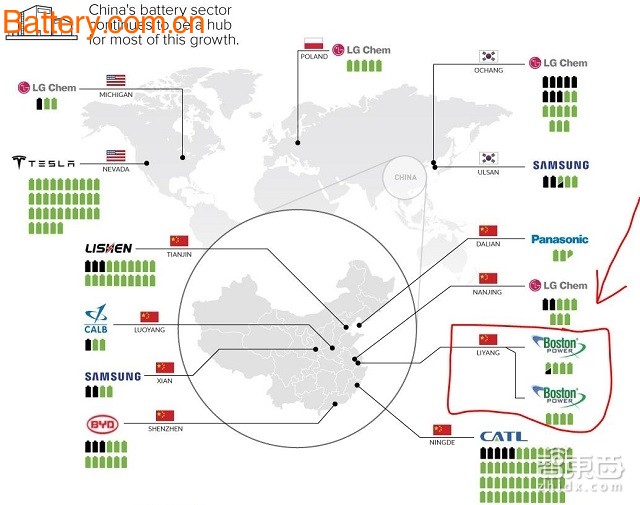In the past 10 years, advances in lithium battery technology have led to the emergence of many emerging products. Electric cars , drones, and smart phones are all inseparable from the advancement of battery technology. When it comes to portable batteries, because there is no new battery technology, we will still use lithium batteries for some time to come. As can be seen from the above figure, lithium batteries are mainly produced in 4 countries: China accounts for 62%, output 108GWh; US ranks second, accounting for 22%, 38GWh; South Korea ranks third, accounting for 13%, yield 23GWh The fourth place in Poland, accounting for 3%, the output is 5GWh. For a long time, we have been talking about new battery technology and batteries, and we know that many companies are trying to improve their technology. The battery or cell system consists of a positive electrode, a negative electrode, and an electrolyte. The main component of the positive electrode and the negative electrode is lithium because lithium is much safer than other battery manufacturing materials. There are two ways to improve a lithium battery: The first method: improve the number of cycles. Lithium batteries have a charge/discharge life cycle of about 300-500 times and then "dead". The second method: increase the battery density. The more energy stored in the battery, the smaller the device can be installed. When it comes to battery technology startups, there are some acquisitions worth noting. Vacuum cleaner manufacturer Dyson acquired Sakti3, a company that is developing solid-state batteries. Solid-state batteries do not require electrolytes, so they are cheaper to manufacture and safer. Another company, called Seeo, is also developing solid-state batteries that use nano-polymer electrolytes. In August 2015, Bosch acquired Seeo. As can be seen from the two acquisitions, other lithium battery technology startups are also worthy of attention. Today we have compiled a piece of information to see which lithium battery technology startups are compelling. The list is as follows: The largest lithium battery startup is Boston Power, which has raised $370 million to date and is developing the next generation of lithium battery cells, which can last for 10 years. Visual Capitalist has produced a chart that shows the production status of lithium batteries in China, from which we can find Boston Power. It is estimated that China will become the largest producer of lithium batteries by 2020, with a 521% increase in capacity from 2016 to 2020. Boston Power saw this trend, so it was produced in China to avoid direct competition with Tesla Gigafactory. The British startup Nexeon has raised $108 million. It has developed silicon positive technology using nanomaterials and the technology is complex. Nexeon uses embedded methods to develop batteries. In other words, companies can use new anodes in existing manufacturing processes to increase cell capacity by 30-40%. Nexeon has now built an automated pilot plant that has recently expanded into Asia and entered Japan. Last year, Nexeon raised $38 million, which is the last financing so far, and the company is preparing to use the money to initiate the acquisition. StoreDot is an Israeli company that has raised $66 million to produce batteries (especially quantum dot technology) using nanotechnology, which is 100 times faster. At present, StoreDot faces a problem: the mobile phone is directly connected to the charger, there is no line, and the dedicated 20-pin connector is used. In other words, if the industry is to accept its technology, the entire ecosystem will change. Doron Myersdorf, founder and CEO of StoreDot, believes that the company will be able to mass production this year. Amprius, a California-based startup, has invested $55 million to build positive electrodes from silicon nanowires. According to the company's introduction, the company is currently designing and selling high-energy batteries. Compared with the most advanced batteries, the energy density of new batteries per unit weight and volume has increased by 15-30%. Amprius also said that many smartphones launched in 2013 and 2014 use the technology it developed. From the website information, Amprius seems to have entered the electric vehicle market. The company claims: "Amprius silicon nanowire electrode can increase the energy density of lithium battery , so that the energy density is 1.4 times to 10 times before. This battery is very suitable for electric vehicles. ." Solid Energy, a Massachusetts-based startup that is developing ultra-thin metal anodes, can double the energy density of the electrode. So far, Solid Energy has raised $20.5 million, a total of three rounds of funding, and GM is involved in the investment. Recently, Samsung's mobile phone battery caught fire, and Solid Energy quickly pointed out that the electrodes they used would not catch fire. Founded in 2007, ActaCell is headquartered in Austin, Texas and was acquired by Contour Energy Systems in 2012. Contour Website has not been operated so far, so we don't know if it will go bankrupt. ActaCell has raised a total of $9.8 million. In 2010, the US Department of Commerce invested $3 million, including the money; the company uses magnesium spinel to produce positive electrodes and nanocomposites to produce negative electrodes. Please note that Google has invested in ActaCell. In Massachusetts, there are a startup company called Cadenza Innovation, which received $ 5 million investment, the company is developing new lithium battery packaging technology. Founder Christina Lampe-Onnerud is the founder of Boston Power, and she knows the battery well. Cadenza received an investment from the US Department of Energy. In 2014, the Department of Energy handed over a four-year project to Cadenza to increase battery energy density and improve electric vehicle batteries. Cadenza has developed a multi-function battery packaging technology that is less expensive and doubles in energy density to control the impact of collisions on the battery. Colorado startup Prieto has raised $2.5 million and investors include Intel, Stanley Black & Decker. The company is developing 3D lithium battery technology, which can make battery prices more competitive, increase charging speed, and use longer. Instead of using a liquid electrolyte, the battery uses a conductive foam that changes shape and fits into a space where the battery could not be installed. In the end, the company was acquired by SWK. QuantumScape is a startup company based in San Jose. This company is mysterious and has received investment. Investors including the public, the amount of financing is unknown. QuantumScape's goal is to develop a solid-state fire-resistant battery that can double the cruising range of an electric car. The technology used by QuantumScape is licensed by Stanford, and Stanford has developed new technologies with the support of the US Department of Energy. QuantumScape is secretly operating, and there is not much information available. If one day, Volkswagen suddenly launches a car, its cruising range is twice that of Tesla . Don't be surprised, its technology may come from QuantumScape. Founded in 2004, Oxis Energy has received an investment and the amount is unknown. The company is headquartered in the UK. Oxis Energy is developing lithium-sulfur battery materials. The company applied for a patent, which said that the new technology is safer, lighter and easier to maintain. Compared with the traditional lithium battery technology, the new battery can be cycled 1500 times. Even if the nail and bullet pass through the battery, it can still be used. Oxis Energy is currently building a factory to produce batteries. In today's list, we have eliminated some lithium battery technology startups, such as Brightvolt, whose goal is to develop thin-film batteries, which are used in small devices such as IoT products and credit cards. Why do you want to eliminate it? Because today's focus is different: which lithium battery technology can extend the car's cruising range, can extend the phone's battery life, can make the drone fly farther, this is the focus today. For this reason, some companies have been overlooked, such as Alevo and 24M, which are looking for new large-scale grid solutions. Lithium batteries will only become more and more popular. In 2017, the price of lithium batteries will drop by at least 15%, and has dropped by 70% in the past five years. Considering that a few companies have succeeded, we seem certain that in the next few years, these startups will at least bring in a new lithium battery technology that is ultimately used by us. Auto Parts Used For Joylong Hiace Engine Hood,Joylong Hiace Car Door,Joylong Hiace Tailgate Rear Door,Joylong Hiace Engine Hood Baoying Shuguang Auto parts Factory , https://www.shuguangautoparts.com
